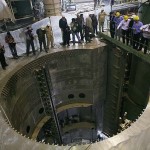How US Espionage Delays the Iranian Bomb
 Writing in the New Republic, Eli Lake looks at the evidence that the U.S. has been sabotaging Iran's nuclear program.
Writing in the New Republic, Eli Lake looks at the evidence that the U.S. has been sabotaging Iran's nuclear program.
Important piece in the New Republic by outstanding national security reporter Eli Lake. A glimpse behind the pay wall - but you'll really want to pay to read the whole thing:
[D]o sabotage efforts work? In late 2008 and early 2009, the IAEA began to see a drop in the amount of low-enriched uranium (LEU) being produced at Natanz, the facility that lies at the center of Iran’s known nuclear weapons program. In the fall of 2008, its centrifuges were producing 90 kilograms a month of LEU. By the end of the year, however, the same centrifuges were producing 70 kilograms of LEU. To be sure, that number was back up to 85 kilograms per month at the close of 2009, and it has been climbing since, to around 120 kilograms a month; but those increases came after the installation of more centrifuges—all of which suggests that at least some of the machines were less efficient than they should be.
Ivan Oelrich, a nuclear scientist and the vice president of the strategic security program at the Federation of American Scientists, estimated in a study this year that the centrifuges are operating at 20 percent efficiency. “We know the average efficiency of the centrifuges is dismal. We don’t know whether it is because of the quality of the individual centrifuges or how they are linked together,” he explains. “We can’t rule out sabotage as one factor leading to these inefficiencies.” Greg Jones, a nuclear analyst at the rand Corporation, says the Iranians “are operating just under four thousand machines, but they have installed about eight thousand five hundred. Those nonoperating machines have been installed for many months. Why they are not operating is not clear.”
Among people I spoke to, there seemed to be a broad consensus that sabotage was, at the very least, slowing Iran’s quest for a nuclear weapon. A senior administration official told me that there was evidence the Iranians are experiencing delays due to “a combination of reasons—some inherent to the nature of the infeasibility of the design and the machines themselves, and some because of actions by the United States and its allies.” Explains David Kay, “History says that these things have done more to slow programs than any sanctions regime has or is likely to do.”
Update: You can read the whole thing here.
Cross-posted at AndrewSullivan.com